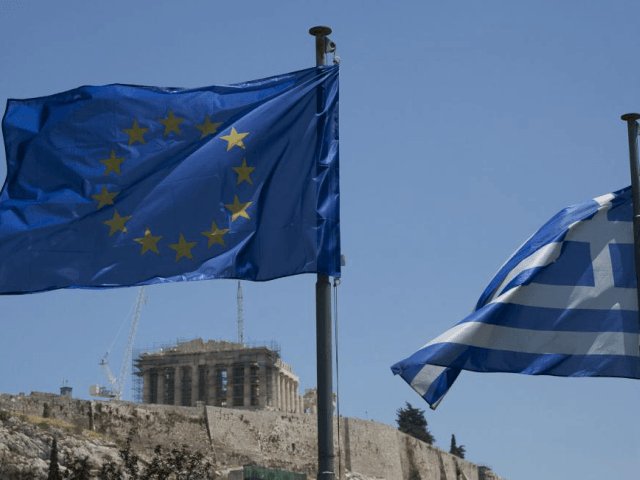Chairman of the Joint Chiefs of Staff Gen. Joseph Dunford told reporters during a visit to Greece Tuesday that the Pentagon is considering expanding its cooperation with Athens and its general presence in the country, citing easier access to battle theaters in Libya and Syria.
Dunford’s announcement, and his visit to the country, also follows months of growing tensions between Greece and Turkey, which is outraged that Athens refuses to hand over former Turkish soldiers believed to have had involvement in the failed 2016 coup against President Recep Tayyip Erdoğan. It also follows the publication of reports that China is looking to make Greece a more prominent player in its One Belt, One Road (OBOR) global infrastructure domination project, potentially indebting the economically troubled country not shortly after it finally appeared to overcome the worst of the debt crisis that began to consume the country in 2010.
“(They) made a general overture saying they would be willing to consider that, and I certainly was enthusiastic about the possibility,” Dunford told reporters, according to Stars and Stripes, referring to expanding America’s military presence in the country. “We … have taken advantage of Souda Bay — it’s a critical piece of infrastructure here in the region, and Greece has also been open to expanding training opportunities for our forces that are stationed in Europe, in particular for U.S. Army units to do training with helicopters.”
“If you look at geography, and you look at current operations in Libya, and you look at current operations in Syria, you look at potential other operations in the eastern Mediterranean, the geography of Greece and the opportunities here are pretty significant,” Dunford told reporters, according to the Military Times. The publication noted that Dunford specified that any further cooperation with Greece would not have any relation to America’s current ties to Turkey, where American forces have used the Incirlik Air Base for years. Yet an unnamed official speaking to the publication did note that officials in Athens were growing increasingly concerned with Ankara’s belligerence towards them.
“They’ve always had a nervousness about their NATO ally Turkey,” one official said, adding that Greece has “been looking around this neighborhood and recognizing the same instability … that we have.”
Members of Turkey’s ruling Islamist Justice and Development Party (AKP) threatened to invade Greece over a dispute regarding Aegean islands in February. Since then, Turkey has used its air force to threaten violations of Greek airspace, triggering warning shots from the Greek military, and engaged in other provocative activity like holding flyovers in international waters close to Greece.
Dunford met with Greek counterpart Adm. Evangelos Apostolakis on Tuesday and has since left to Pakistan, joining Secretary of State Mike Pompeo for a visit there.
America’s diplomats have recently expressed a similar interest in expanding ties with Greece. Geoffrey Pyatt, America’s ambassador to Athens, told the right-leaning Kathimerini newspaper in an interview published Sunday that that he was happy to announce “the Americans are back in a really big way.”
“We are bringing our best game. This is as good as it gets. We are doing it with strong support from the Greek government but also the opposition political forces, but we are trying to do so in a way that captures imaginations but also builds a foundation for our long-term engagement and continued partnership,” he said, emphasizing that both government and trade ties were part of the efforts to bring the two countries closer.
Pyatt noted also that “Greece is playing a more ambitious foreign policy role today” than it could during the height of the debt crisis and that Athens and Washington share concerns about Turkey’s behavior in the region.
The ambassador added that the United States is “obviously very concerned about malign actors in this region, the issues around the role that Russia continues to play in the wider region and also the question of China.”
Last week, Chinese Foreign Minister Wang Yi signed an agreement with Greek officials to expand the role of OBOR in Greece. The Belt and Road plan sees China modernizing and rebuilding ports, rails, and roads throughout Europe, Asia, and Africa to allegedly reconstruct the ancient silk road, leaving China with control of transportation from Beijing to Western Europe. As the gateway to Europe, Greece can play a pivotal role for China.
In 2015, the China Ocean Shipping Company (COSCO) made Beijing’s biggest move in Greece, buying the port in Piraeus, the largest passenger port in Europe. China spent a billion dollars on refurbishing and controlling Piraeus and has since bought ports in Belgium, Spain, and Italy.

COMMENTS
Please let us know if you're having issues with commenting.